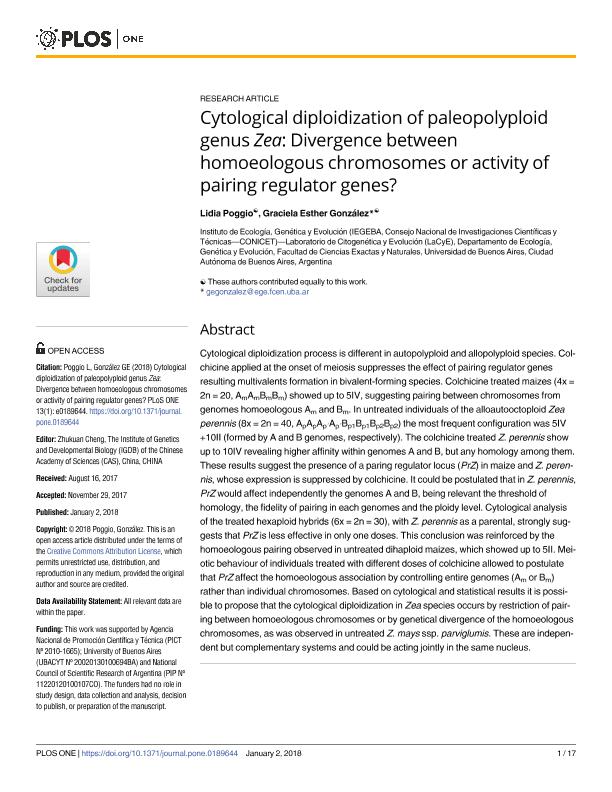Artículo
Cytological diploidization of paleopolyploid genus Zea: Divergence between homoeologous chromosomes or activity of pairing regulator genes?
Fecha de publicación:
01/2018
Editorial:
Public Library of Science
Revista:
Plos One
ISSN:
1932-6203
Idioma:
Inglés
Tipo de recurso:
Artículo publicado
Clasificación temática:
Resumen
Cytological diploidization process is different in autopolyploid and allopolyploid species. Colchicine applied at the onset of meiosis suppresses the effect of pairing regulator genes resulting multivalents formation in bivalent-forming species. Colchicine treated maizes (4x = 2n = 20, AmAmBmBm) showed up to 5IV, suggesting pairing between chromosomes from genomes homoeologous Am and Bm. In untreated individuals of the alloautooctoploid Zea perennis (8x = 2n = 40, ApApAp´Ap´Bp1Bp1Bp2Bp2) the most frequent configuration was 5IV +10II (formed by A and B genomes, respectively). The colchicine treated Z. perennis show up to 10IV revealing higher affinity within genomes A and B, but any homology among them. These results suggest the presence of a paring regulator locus (PrZ) in maize and Z. perennis, whose expression is suppressed by colchicine. It could be postulated that in Z. perennis, PrZ would affect independently the genomes A and B, being relevant the threshold of homology, the fidelity of pairing in each genomes and the ploidy level. Cytological analysis of the treated hexaploid hybrids (6x = 2n = 30), with Z. perennis as a parental, strongly suggests that PrZ is less effective in only one doses. This conclusion was reinforced by the homoeologous pairing observed in untreated dihaploid maizes, which showed up to 5II. Meiotic behaviour of individuals treated with different doses of colchicine allowed to postulate that PrZ affect the homoeologous association by controlling entire genomes (Am or Bm) rather than individual chromosomes. Based on cytological and statistical results it is possible to propose that the cytological diploidization in Zea species occurs by restriction of pairing between homoeologous chromosomes or by genetical divergence of the homoeologous chromosomes, as was observed in untreated Z. mays ssp. parviglumis. These are independent but complementary systems and could be acting jointly in the same nucleus.
Palabras clave:
ZEA
,
PAIRIN REGULATOR LOCUS
,
COLCHICINE TREATMENT
Archivos asociados
Licencia
Identificadores
Colecciones
Articulos(IEGEBA)
Articulos de INSTITUTO DE ECOLOGIA, GENETICA Y EVOLUCION DE BS. AS
Articulos de INSTITUTO DE ECOLOGIA, GENETICA Y EVOLUCION DE BS. AS
Articulos(OCA CIUDAD UNIVERSITARIA)
Articulos de OFICINA DE COORDINACION ADMINISTRATIVA CIUDAD UNIVERSITARIA
Articulos de OFICINA DE COORDINACION ADMINISTRATIVA CIUDAD UNIVERSITARIA
Citación
Poggio, Lidia; González, Graciela Esther; Cytological diploidization of paleopolyploid genus Zea: Divergence between homoeologous chromosomes or activity of pairing regulator genes?; Public Library of Science; Plos One; 13; 1; 1-2018; 1-17
Compartir
Altmétricas




